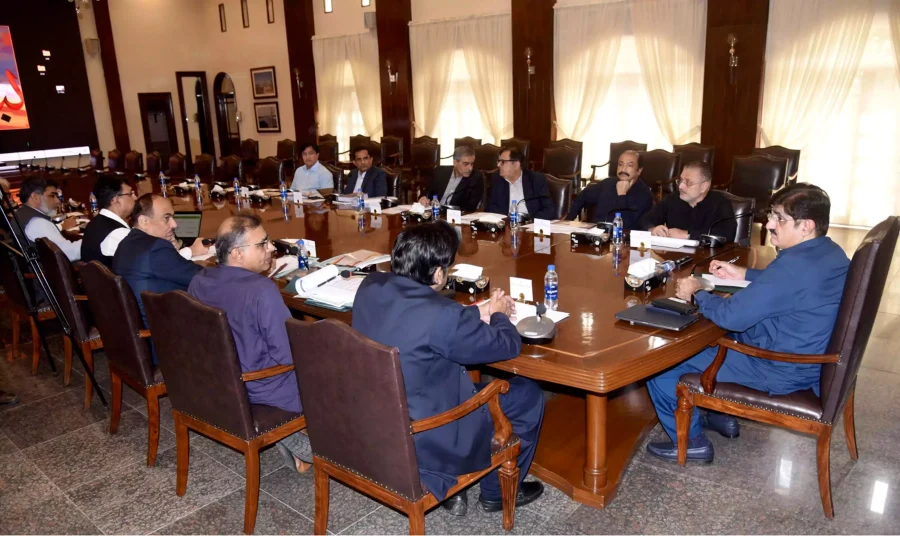Sindh Chief Minister Syed Murad Ali Shah has directed the revenue collecting department to achieve their targets so that the scope of development works and poverty alleviation can be ensured. This he said while presiding over a meeting regarding resource mobilisation here at CM House. The meeting was attended by Senior Minister ET&NC Sharjeel Memon, Chief Secretary Asif Hyder Shah, SMBR Baqaullah Unar, Secretary Finance Fayaz Jatoi, Secretary Excise Saleem Rajput, Secretary to CM Raheem Shaikh, Chairman SRB Wasif Memon, and other concerned officers.
The Sindh Chief Minister Syed Murad Ali Shah emphasised that the governments priority for the next financial year is to implement policies and initiatives to stimulate economic growth and raise all citizens living standards. “Our focus will be on investing in key sectors such as education, healthcare, provision of safe drinking water, sanitation, infrastructure, and agriculture”, he added. The Sindh Chief Minister Syed Murad Ali Shah said the priorities would be achieved when the revenue-collecting departments would achieve their revenue targets.
He said that the Sindh Revenue Board (SRB) had a target of Rs235 billion for 2023-24 and the track record of the SRB showed that it had been surpassing its collection targets. He directed Chairman SRB Wasif Memon to reach the target and send him proposals for next year’s targets. Murad Shah directed the SRB to suggest relief for the taxpayers and proposals for enhancing the SST net for the next financial year.
The SRB chairman assured the chief minister that his organisation would reach the target and he would submit his proposals. The CM said that the E&T dept has a target of Rs143 billion and it has to achieve it. Minister E&T Sharjeel Memon said that he had taken strict measures to achieve the tax collection target and would hopefully, give him good news at the end of June 2024. The meeting was told that the Board of Revenue has a target of Rs55.218 billion for 2023-24.
At this, the Sindh Chief Minister Syed Murad Ali Shah directed the SMBR to take measures to reach the collection target and send him budget proposals for the next financial year. Murad Ali Shah directed Chief Secretary Asif Hyder Shah to revamp the entire collection system of the Board of Revenue.Sindh Chief Minister Syed Murad Ali Shah directed him to make it easy and simple and hold the Assistant Commissioners and Mukhtiarkars responsible for collection. Talking about ongoing development schemes, the CM said that 5250 ongoing development schemes of Rs380.5 billion were in progress and he would try to complete a maximum number of them during the next financial year.
Power generation from Thar coal reaches 2,640 MW
Thar coal is currently contributing approximately 2,640 MW of electricity to the national grid from its two blocks, with power generation expected to reach about 3,280 MW by the end of this year. Azhar Malik, Vice President of Site Operations at Sindh Engro Coal Mining Company (SECMC) for Thar Coal Block II, disclosed this while speaking to the media in Islamkot, Tharparkar. Malik mentioned that each block produces 1,320 MW of electricity.
He highlighted that Thar coal could save Pakistan $8 billion annually by generating cheaper electricity and suggested shifting cement and urea fertilizer plants to Thar coal to strengthen the country’s economy. He noted that the cost of electricity from furnace oil is Rs 49 per unit, from RLNG Rs 51 per unit and from imported coal Rs 41 per unit, while
Thar coal generates electricity at Rs 24 per unit and with increased production, this cost could drop to Rs 20 per unit, benefiting both domestic and industrial users. He added that Pakistan’s electricity demand peaks at 35,000 MW in summer, but Thar coal reserves could generate 100,000 MW of cheap electricity for 200 years.
Currently, SECMC generates approximately 1,320 MW from Block II, with an additional 1,320 MW produced by Chinas Shanghai Electric Company from Block I, he said and added that Thar coal reserves are divided into 13 blocks, each with about 2 billion tonnes of coal, and only two blocks operational at the time. Malik also informed that a project of 105 km railway line from Islamkot to Chhor was approved to transport coal across the country, benefiting industries like cement and textiles by providing a cheaper fuel alternative.
The General Manager (CSR) of Thar Foundation Farhan Khan Ansari said that 30 engineers from Tharparkar were sent to China for training, and over 63 percent of local people are employed in various projects, including two local mining managers. The Thar Foundation operates five hospitals, 28 schools, and mobile clinics. They have also started a Coal Mining Technology course with 43 students, including 13 girls, who will also receive training in China. A major livestock project will soon be launched to boost the local economy.










